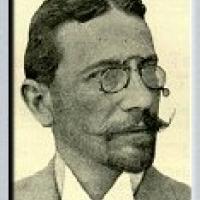
Siegbert Tarrasch
Siegbert Tarrasch was born on March 5, 1862 in Breslau, Germany (now Wroclaw, Poland). In his autobiography (Dreihundert Schachpartien), he wrote that he was born with a club foot Breslau was one of the largest Jewish communities in the world.
In 1877, at the age of 15, he learned how to play chess when he discoverd chess books. His city was the home of Anderssen and Zukertort. He had met Anderssen at one time.
In 1880 he started his studies in medicine in Berlin.
In 1881 Tarrasch was spending his free time in Berlin cafes, playing chess.
His first attempt in a Hauptturnier (a chess tournament in which only the winner gets the title of master) failed in 1882 in Berlin. He left Berlin and transferred to Halle to concentrate on his studies.
In 1883 he won first prize at the Hauptturneier at Nuremberg and the tile of German Master.
In 1885 he completed his medical degree at the University of Berlin at age 23 and became a medical doctor. He later practiced medicine at Geroldsgrun, Nuremberg, and Munich.
In 1885 he tied for second at Hamburg, behind Gunsberg. This was his first appearance in an international masters' tournament.
In 1890 he was the champion of Germany
In the winter of 1890-91 the Havana Chess Club invited Tarrasch to come to Cuba and play Wilhelm Steinitz for a world championship match. Tarrasch declined the invitation becuase he was too busy with his medical practice. Steinitz, in dire need of money, then asked Lasker if he would play for the world championship match. Lasker accepted and won the title in 1894.
In 1894 he published a collection of 300 of his best games.
At Hastings 1895 he took 2nd place, behind Pillsbury.
From 1895 to 1925 he was the leading authority on chess.
By 1903 he had won more strong tournaments than any other player (7 out of 13 in which he had competed).
In October 1903 terms were agreed for him to play Lasker for the world championship. Then Tarrasch injured himself while skating and asked for a year's postponement. Lasker declined and there as no match.
In 1907 he won at Ostend and awarded himself the title of chess tournament champion of the world.
From August 17, 1908 to September 20, 1908 he played Lasker for the world championship and was beaten. They played their match in Duesseldorf and Munich. Lasker won 8, lost 3, and drew 5.
In 1914 he was one of the original Grandmasters named by Czar Nicholas (along with Lasker, Capablanca, Alekhine, and Marshall).
One of his sons, Fritz, died in the First World War. He died on May 14, 1915. He was a Lieutenant in the 15th Bavarian reserve infantry regiment. Tarrasch's second son committed suicide. Tarrasch's 3rd son was run over by a train in Munich in 1916 and died.
His last tournament was in 1928 in Berlin. An illness compelled him to retire after 3 rounds and he never played in a chess tournament again.
His last chess book, Das Schachspiel was published in 1931.
In 1932 he published his own chess magazine, the Tarraschs Schachzeitung. He published his magazine the last 18 months of his life.
He died on February 17, 1934 in Munich at the age of 71.





